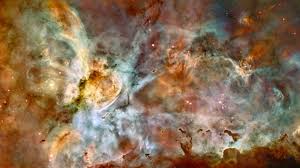"God doesn't exist."
"Yes, He does. He created everything."
"Watch your pronouns! No, she didn't. Evolution did."
"Evolution's not true. Evolution doesn't explain how life started."
"Nor does God. Just saying God did it doesn't prove it."
"There's no proof of evolution - it's just a theory! Theories aren't facts."
"The fact is religion's just a belief."
"So's your atheism - that's a religion."
You'll recognise some of that: the Science versus Religion argument. (Note the capitals: Science and Religion as different ways of knowing - not of any particular versions of each.)
There you were, thinking that was over, that it was done and done with, and it's not over or done with at all. It's back.
It's back because people have two different ways of explaining the same thing: the mystery of existence. That includes all of us. There's no getting away from it. The argument goes on and on as everyone argues that one of the other, Science or Religion, must be right, must be true.
One way out is to ignore it, but that's no answer. A better way is not to bother about what's true or not true and to think how the argument came about in the first place.
When did people start disagreeing like this? That is the question, because once upon a time the disagreement wasn't there on anything like the scale it is today. People argued all the time, but they argued about which religion was true, not whether Religion or Science was.
In the west, you can say it started around the beginning of the seventeenth century - 1600 and something. There's no firm or agreed date for it, and there was certainly not the remotest possibility of seeing how it would develop into what it is now. It was the beginning of the Scientific Revolution, of something that had not happened before.
People argue about the Scientific Revolution, of course, Nevertheless, that time period can be seen as the start of a fundamental change in thinking. Not sudden, not general; sporadic, scattered - not involving anything like the majority of people, who went on thinking as usual. (Just like today really. For heavens sake, what is a computer?)
The coming of Science was the start of people thinking that there is another way of thinking.
They started thinking about and studying the natural world as the natural world; and slowly learned, to their confusion and unease, that the inquiry led inevitably to themselves; to what and who they were as a part of it. They had different answers.
"It leads back to God Who gave us everlasting life."
"That's a lovely story. But it looks like the Universe itself is just infinite and eternal."
And so on and so on. There's no end to Eternity.
















